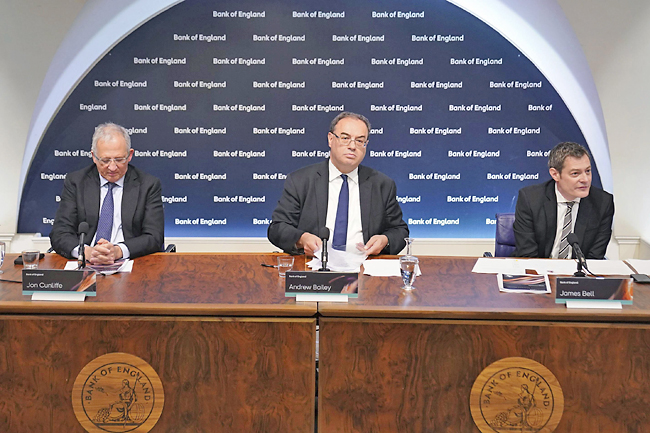LONDON (AP) – The Bank of England raised interest rates by half a percentage point yesterday, marking its biggest hike in more than 27 years as it seeks to tame accelerating inflation driven by the fallout from Russia’s invasion of Ukraine.
The increase, passed by a 8-1 vote by the bank’s monetary policy committee, pushes the bank’s key interest rate to 1.75 per cent, the highest since the depths of the global financial crisis in December 2008. Most economists expected the hike after Governor Andrew Bailey said two weeks ago that the United Kingdom’s (UK) central bank would “act forcefully” if the inflation picture worsened.
The Bank of England has been criticised for moving too slowly to combat inflation, which accelerated to a 40-year high of 9.4 per cent in June and has driven a cost-of-living crisis.
While the central bank has approved five consecutive rate increases since December, none before yesterday exceeded a quarter-point.
By contrast, the United States (US) Federal Reserve increased its key rate by three-quarters of a point in each of the past two months to a range of 2.25 per cent to 2.5 per cent. The European Central Bank’s first increase in 11 years was a larger-than-expected half-point hike last month.
Central banks worldwide are struggling to control surging inflation without tipping economies into recession that were just beginning to recover from the coronavirus pandemic. Higher interest rates raise borrowing costs for consumers, businesses and the government, which tends to reduce spending and ease rising prices. But such moves are also likely to slow economic growth.
The International Monetary Fund (IMF) last week cut its outlook for global economic growth, citing higher-than-expected inflation, continuing COVID-19 outbreaks in China and further effects from the war in Ukraine. The UK economy is likely to expand just 0.5 per cent next year, the slowest growth rate among the world’s advanced economies, the IMF said.






